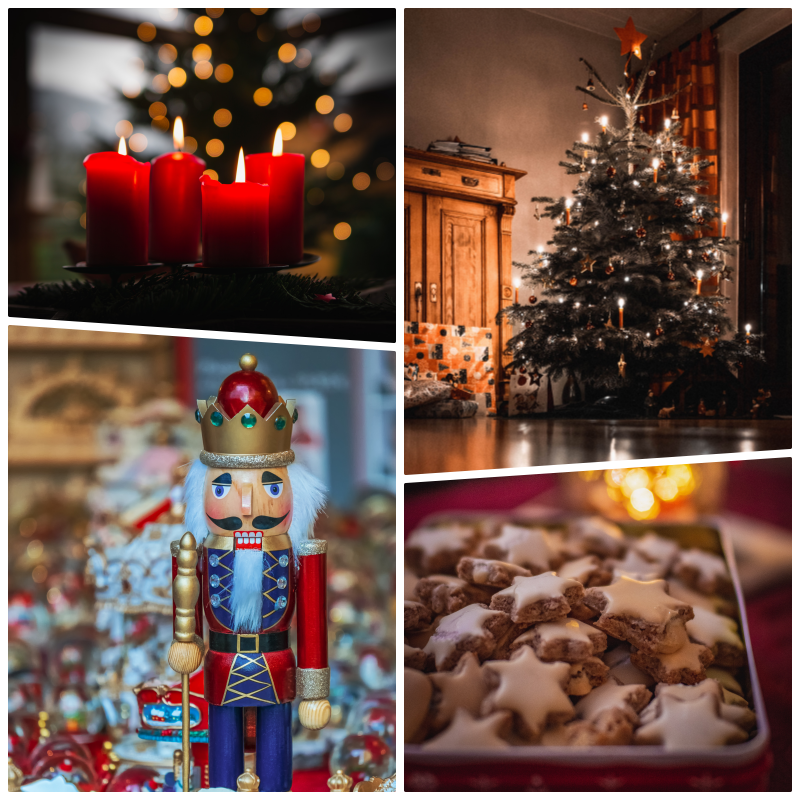Christmas Cult
For years I convinced myself that German Christmases were boring. The markets were nice, and the never-ending supply of Plätzchen was greatly appreciated, but when it came to the main event, Weihnachten was always a letdown. British Christmases, at least in my mind, were a blur of friends, pubs, mince pies, dodgy office parties, pubs, lights, crackers, pubs, and a half remembered speech by an elderly monarch. What Germany spread over three Weihnachtstage (24th, 25th, 26th December), we in Britain packed into one glorious explosion of food, gifts, alcohol, and family politics on the 25th December. I hadn’t understood up until that point how much culture plays a part in the Christmas experience. There are a thousand little differences that separate British and German Christmases, with just over half of those differences being food-related.
The first Christmas I spent in Germany was way back in 2009, and it felt like just any other day. The slow unfolding of German Christmas felt inherently wrong, a feeling that was only exacerbated when I grasped that German Christmas Dinner would feature none of the things I had come to expect. Instead of turkey, there was a sombre meal of sausages and potato salad, which was nice, but felt far less festive than my expectations. None of the markers of festive cheer were to be found anywhere, the strongest drink on the table was Apfelschörle, and there were barely any arguments. The only element of Christmas I recognised was watching the 'Doctor Who' Christmas Special, which I did alone and only so it would least feel a little more like Christmas, and not like a bog standard Tuesday.
Frankly all the differences came as a surprise since I was more than aware how much British Christmas owed to its German cousin. I knew things would be different, but I had no idea what having Christmas Day on the 24th would feel like, the fact that the tree would sit forlornly outside my wife’s parents house until it was brought in after lunch and decorated on the day rather than weeks in advance. Equally, the exchange of gifts in the evening felt like the world was being turned upside down, changing the entire rhythm of Christmas. In Britain, the tree usually goes up at least a week before Christmas Day, while presents are opened before lunch. Everything I had come to expect was thrown wildly off beat, with fewer lights, far less noise, and not a hint of a Brussel sprout or Christmas pudding to be found anywhere. It was like hearing your favourite Christmas Carol played in a different key, while the lyrics are sung backwards.
When I voiced these feelings to my wife as we went to bed on the 24th, she attempted to ease my mind by telling me that there would be a more special dinner on the 25th. I was informed that we would be having something called Raclette. For those who have never had the pleasure, Raclette is a Swiss invention, which requires a small electric oven be placed in the centre of the table, with everyone being issued a tiny pan with which they can cook various different ingredients that have been helpfully placed in bowls all around. This being a Swiss peculiarity, I was guaranteed that whatever I was feeling as I went to bed would be easily rectified with an abundance of melted cheese.
What I learned then, and know now, is that Raceltte is far more interesting to hear about than actually take part in. You fill your small metal pan with ingredients, wait for an eternity for an electric filament to slightly warm your food, and then you eat your slightly warmed collection of meat and vegetables, covered in slightly gooey cheese. I’d never really thought too much about Christmas dinner, nor had I thought about alternatives to what seemed a universal tradition, but during that first foray into Raclette, I would have happily invaded Switzerland for chance to eat a small slice of turkey.
I was so scarred by my first German Christmas experience that I wouldn’t do it again for ten years. When Christmas came, I would book myself a flight back to the UK and spend the festive period as God intended, while my wife would head to her parents for their bizarro Weihnachten. When I told people about my plans, they would give me a look that suggested I was doing something weird by leaving my wife behind to make merry in the UK, but I put that down to jealousy more than anything else. Things would probably have continued this way had it not been for the birth of our daughter and the arrival of the pandemic. Instead of getting a flight back to the UK, I found myself planning a Christmas at home instead, and I was determined that it would not be a repeat of my experience in 2009.
As I began planning, it quickly became apparent how difficult it would be to have a British Christmas in Germany. “Britmas” as we christened it, would clearly not include all of the markers of a typical British Christmas, if only because many things would be hard or very expensive to recreate here, especially during a lockdown. For instance, traditional mince pies are made with suet, which is basically dried meat fat. I’m not sure exactly why that’s an ingredient in a dessert, but trying to find somewhere that sold it nearby was impossible. The closest I got was finding some kind of animal feed which used it as a base, and after several days of consideration I opted to buy pre-made mincemeat instead, which of course cost a fortune.
As December went on, I became evermore single minded in my pursuit of the perfect Christmas. I bought decorations, sourced Christmas crackers, and spent hours looking for turkey. It was during this particular search that I had an epiphany: I hate turkey, I’ve always hated turkey, and I had no idea why I wanted to prepare and cook something I actually didn’t like, and knew no one else in my family enjoyed. I can only equate that feeling with what I assume people feel when they suddenly realise they're in a cult. After this first realisation came many others, chief amongst them being that the pandemic had actually given us a chance to celebrate not only Christmas in the way I wanted to, but in the way my new little family wanted too.
I finally understood the genius of spreading Christmas over three days - we could blend German and British Christmas together and have the best of both worlds. We could have a sedate, relaxed traditional German Christmas on the 24th, loud bright and drunken Britmas on the 25th and still have a spare day to recover. We could forget the turkey, and have Braten instead, plus Brussel sprouts and Yorkshire puddings. We could pull crackers, eat dinner, and wash it all down with a shot of Schnapps. We could have Kaffee und Kuchen, instead of stodgy Christmas Pudding. In short, we could have the best Christmas ever by simply doing something so bloody obvious, something we had been doing for over a decade: taking the best of both mine and my wife’s cultures, mixing them all together and seeing what came out. If it worked for having a daughter, hell, why not Christmas too?
I realised, probably far later than many others, that I had been trying to recreate a Christmas that I remembered as a child, without ever really considering how impossible that would be. I wanted Christmas my way, a trap I think many of us who move away to live in a different country fall into. Whether it’s Christmas, Thanksgiving, or Halloween, many of us are chasing something that we can never really catch, our memories. Instead, we should take advantage of the fact we don’t have to do what our cultures dictate, we can do something different, and, dare I say it, better. That being said, there’s still no Raclette, and we always have crackers, after all, I’m only 40% German.
Image Credit
Photo by Sandra Grünewald on Unsplash
Photo by Ilona Frey on Unsplash
Photo by Jonathan Kemper on Unsplash
Photo by David Beale on Unsplash
Photo by Annie Spratt on Unsplash
Photo by Diliara Garifullina on Unsplash
Photo by lasse bergqvist on Unsplash







